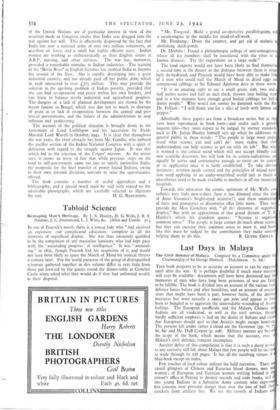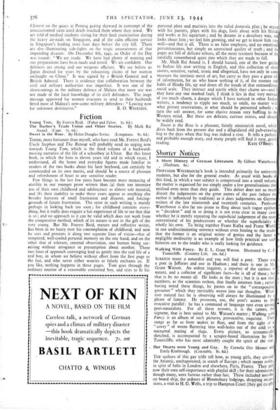Last Days in Malaya
The Civil Defence of Malaya. Compiled by a Committee under th Chairman;hip of Sir George Maxwell. (Hutchinson. 7s. 6d.) THIS book purports to be as accurate an account as can be expected until after the war. It is perhaps doubtful if much more material will ever be available: documents will have been destroyed and al memories of men who have long been prisoners of war are likely to be fallible. The book is divided into an account of the various local defence forces before and after hostilities, and an account of evacua- tions that might have been a part, however futile, of the defenc measures but were actually a sauve qui peut and appear to has'- been so bungled as to aggravate the unavoidable wounding of Asiam feelings. The European unofficials and the Malays, Chinese all Indians are all vindicated, as well as the civil service, thoug hardly sufficient emphasis is laid on the desire of Sultans and chief that Europeans should quit so that Asiatics might escape bombing. The persons left under rather a cloud are the Governor (pp. 76, 71 85, 89) and Mr. Duff Cooper (p. io8). Military matters are beyon the scope of the book, which means that the account, even Malaya's civil defence, remains incomplete.
Another defect of this compilation is that it is such a dusty answ to any curiosity still felt about Malaya that few people will be inchn to wade through its 528 pages. It has all the numbing virtues of blue-book except an index.
Few touches of local colour enliven the bald narrative. There casual glimpses of Chinese and Eurasian blood donors, men women ; of European and Eurasian women waiting behind in censor's office at Penang to destroy records and code books, and two young Indians in a Salvation Army canteen who expre less concern over personal danger than over the loss of half t crockery from artillery fire. We see the crowds of Indians
Chinese on the quays at Penang gazing skyward in contempt of the unaccustomed siren until death reached them where they stood. We are told of medical students sitting for their final examination during the heavy air-raids on Singapore, and of the calm efficient service in Singapore's leading store four days before the city fell. There are also illuminating side-lights on the tragic unawareness of that impending disaster. On December 8th, 1941, an Order of the Day was issued : "We are ready. We have had plenty of warning and our preparations have heal made and tested. We are confident. Our defences are strong and our weapons efficient. We see before us Japan drained for years by the exhausting claims of her wanton onslaught on China." It was signed by a British General and a British Admiral. There is evidence that collaboration between the civil and military authorities was imperfect. It was one of the shortcomings in the military defence of Malaya that more use was not made of the local knowledge of its civil defenders. The inept message approved for women evacuees to send to their husbands fitted most of Malaya's new-come military defenders: "Leaving now























 Previous page
Previous page